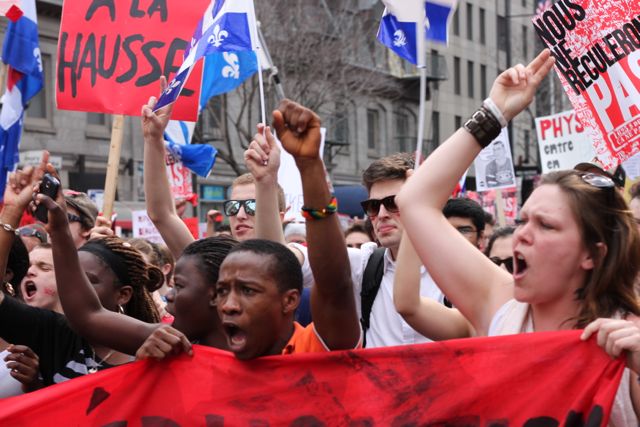
It’s been a year since over 200,000 students donning red hit the pavement on an irregularly warm day on March 22, 2012 to protest the proposed tuition fee increase of $1,625 by former Premier Jean Charest. It was the largest demonstration in Canadian history to date and marked the beginning of a tumultuous spring for Quebec. It raised questions about post-secondary education, triggered an election and gave way to unparalleled student unrest. It brought forward nightly demonstrations and forced a divide based on ideological differences in what could be argued as one of the most historic years in Quebec.
MARCH 22, 2012
Over 200,000 demonstrators pour in from all corners of the province to protest the proposed increase by the Charest Liberals of $325 per year over a five-year period for a total of $1,625. Traffic is affected for hours and protesters make international news. Not a single arrest is made.
APRIL 27, 2012
The provincial government offers a new deal to student leaders, including a revision in the tuition fee increase from a total of $1,625 over five years to a total of $1,778 over seven years. Angry with the revision, students take to the streets for the third night in the row in what becomes regular night protests for months.
MAY 4, 2012
Students arrive to protest outside the Quebec Liberal Party convention in Victoriaville, Que., a town located two hours east of Montreal. Tensions run high as the gathering quickly turns violent, pitting demonstrators against officers from the Sûreté du Québec. Over 106 arrests are made, with two officers and six demonstrators seriously injured by the end of the night.
MAY 14, 2012
Following failed negotiations with student leaders, Education Minister Line Beauchamp steps down from her position, saying that she is “no longer part of the solution” to the student crisis. Michelle Courchesne takes Beauchamp’s place.
MAY 18, 2012
The provincial government passes an emergency controversial law aimed at curbing protests in Quebec in response to large student strike demonstrations and growing civil unrest. Bill 78 imposes hefty fines for blocking access to class, suspends the winter semester for post-secondary institutions affected by the strike and requires an itinerary to be submitted in advance for demonstrations consisting of more than 50 people. A protest takes place the same night in downtown Montreal.
MAY 22, 2012
The student strike marks its 100th day by holding a large day protest in Montreal where thousands march peacefully through the streets. In commemoration, a large demonstration is held on the 22nd during the following months.
MAY 28, 2012
Approximately 700 lawyers march silently from the Montreal courthouse to condemn Bill 78. This marks the 35th consecutive night protest.
JULY 25, 2012
Léo Bureau-Blouin, former president of the the Fédération étudiante collégiale du Québec, announces his candidacy with the Parti Québécois in the riding of Laval-des-Rapides.
AUGUST 1, 2012
Premier Jean Charest calls a provincial election set for only 34 days later on Sept. 4.
AUGUST 8, 2012
Gabriel Nadeau-Dubois resigns from his position as the spokesperson of the Coalition large de l’Association pour une Solidarité Syndicale Étudiante stating that the organization “needs fresh faces” in the ongoing student crisis.
SEPTEMBER 4, 2012
The PQ wins the election with a minority government and Pauline Marois becomes the first female premier of Quebec. A shooting midway through Marois’ victory speech kills one man and injures another during the PQ’s celebrations. Charest officially leaves politics after a 28-year career.
SEPTEMBER 5, 2012
Marois announces the abolishment of the tuition fee increase of $1,778 over a seven-year period.
NOVEMBER 20, 2012
The PQ announces its provincial budget but remains relatively quiet regarding tuition fees.
DECEMBER 6, 2012
The provincial government announces massive slashes to university budgets province-wide of $124 million by the end of the academic year. Concordia University suffers a $13-million loss.
JANUARY 23, 2013
The provincial government’s slash to Concordia’s funding runs so deep the university is forced to declare a deficit despite adjusting spending habits.
FEBRUARY 15, 2013
University rectors receive official invitations to the PQ’s planned education summit on higher learning, a two-day conference aimed to discuss unresolved issues from the student crisis.
FEBRUARY 25 and 26, 2013
The education summit leaves a bitter taste in student leaders’ mouths after the PQ announces an indexation of tuition fees by $70 per year indefinitely to match inflation. Universities face an additional $250 million in budget cuts and hundreds protest in downtown Montreal.
MARCH 5, 2013
A protest takes place to denounce the indexation of tuition fees, with over 1,000 participants in attendance. Over 53 people are arrested and more demonstrations are planned for the following weeks.
MARCH 22, 2013
Police swiftly end the one-year anniversary protest not even 30 minutes after it begins for violating municipal bylaw P-6 that requires a route to be submitted beforehand. Only a few hundred attend.



